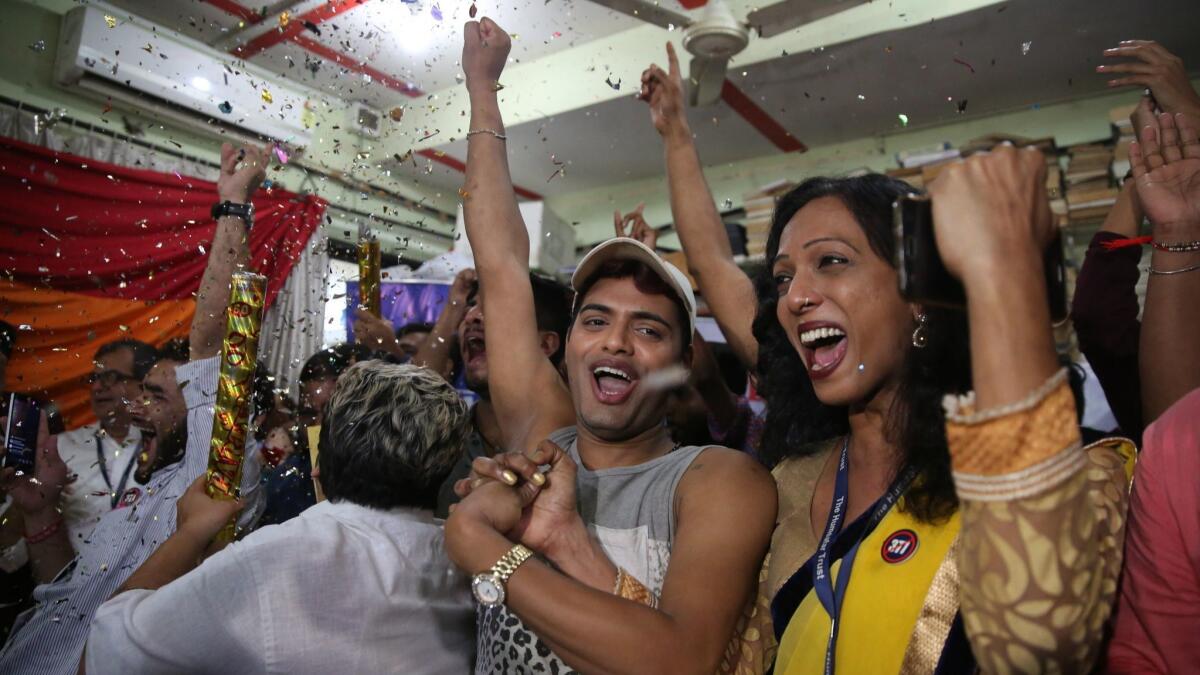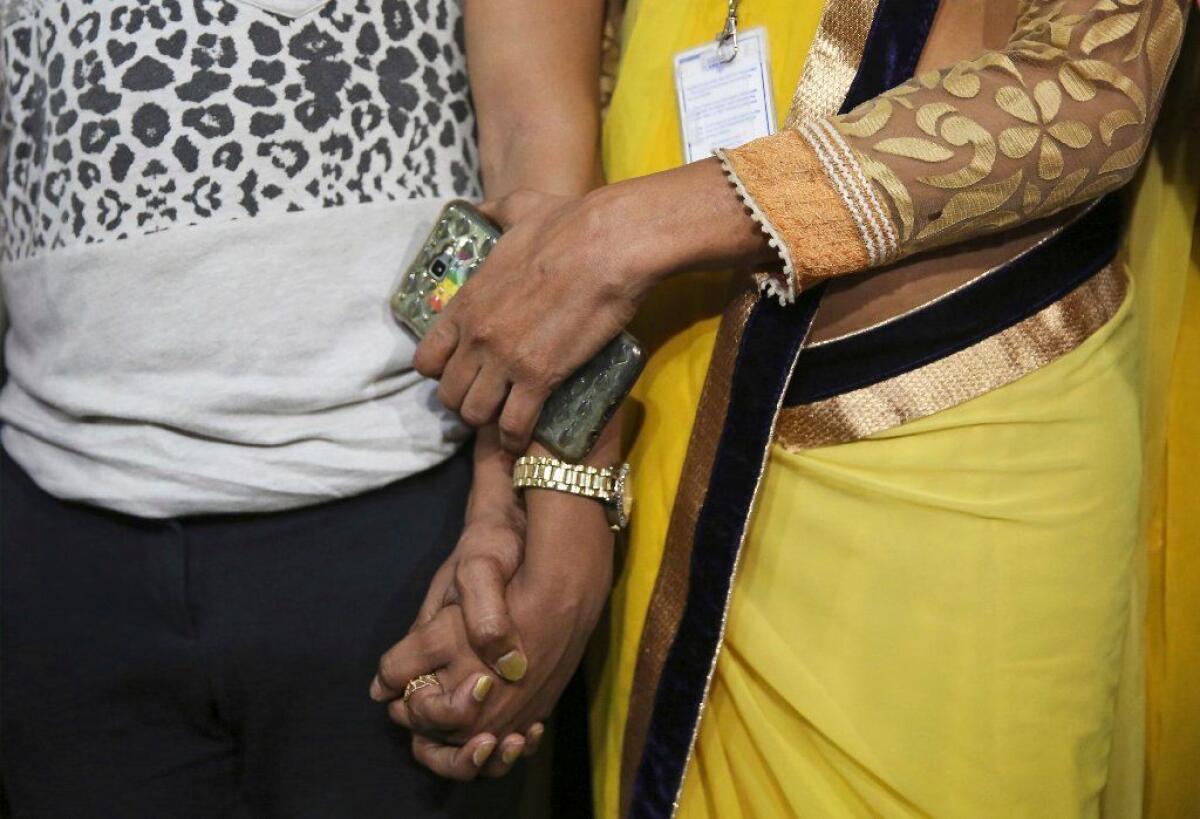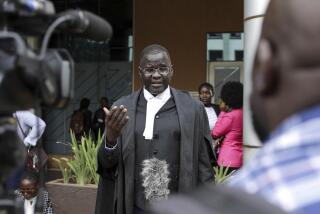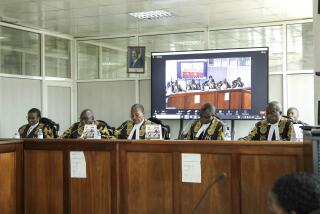‘We’re not criminals anymore’: Indians revel in the repeal of a 157-year-old law banning gay sex

Reporting from New Delhi — She read in the morning paper that the decision was coming, so the 24-year-old master’s student skipped classes Thursday and came to the Supreme Court building flanked by two friends. As they heard the court’s landmark ruling that overturned India’s colonial-era ban on same-sex intercourse, the young women hugged and one cried.
“We’re not criminals anymore,” she said.
But as dozens of activists celebrated on the lawns outside the court, the young woman wearing a short haircut and gold-rimmed spectacles remained in a corner with her friends, shooing news photographers away. She lives at home and is not ready to come out to her parents.
Hers was a private celebration, yet one joined by millions of Indians both closeted and outspoken who cheered a historic victory for civil rights in the world’s largest democracy.
A five-judge panel voted unanimously to overturn Section 377 of the Indian Penal Code, ending a two-decade legal battle against one of the most hidebound relics of India’s colonial past. The law criminalized intercourse “against the order of nature,” which was taken to mean same-sex relations even between consenting adults, and imposed a punishment of up to 10 years in prison.
Prosecutions under the law were rare, but many gay and transgender Indians said the law was sometimes used as a tool of intimidation and extortion.
In a 500-page ruling that invoked ideals of equality, morality, individual choice and even the very nature of love, the judges delivered a thundering denunciation of the 157-year-old statute introduced by British rulers at the peak of priggish Victorian-era values — and upheld by the same Indian Supreme Court just five years ago.

“Section 377 is irrational, arbitrary and incomprehensible,” Chief Justice Dipak Misra said, adding that India’s LGBTQ community possesses the “same equality as other citizens.”
Justice Dhananjaya Y. Chandrachud wrote: “What makes life meaningful is love. The right that makes us human is the right to love. To criminalize the expression of that right is profoundly cruel and inhumane.”
The ruling signaled how far India has come in a short time to become more accepting of its gay and transgender citizens but only decriminalized sexual acts. India still does not permit same-sex couples to marry, adopt or inherit property.
“This fight doesn’t end here,” said Keshav Suri, a 33-year-old hotelier who was one of several citizens who filed suit challenging the law. Suri burst out of the courthouse after the verdict was read and exclaimed to his French husband, whom he wed in Paris last year: “Marry me again!”
Even with other fights ahead, he said, this was a victory to relish.
“I’m illegal no more,” he said. “I’m in the shadows no more. I’m in the darkness no more.”
The sweeping verdict appeared to surprise even the law’s most ardent opponents, some of whom had wondered whether the judges would strike it down on narrow privacy grounds without affirming the broader rights of LGBTQ Indians.
“This is not a narrow, do-what-you-want-in-your-bedroom type of decision,” said Menaka Guruswamy, a lawyer for the plaintiffs. “This is so much wider than that, and the fact that many of the justices linked this to the idea of freedom and consent, that it was unanimous, that all of them looked to India as a constitutional democracy … it’s huge.”
Britain decriminalized homosexuality in 1967 — poet Oscar Wilde and mathematician Alan Turing were among those prosecuted under anti-gay laws — but similar statutes remain in place in dozens of former British colonies, such as Malaysia and Singapore.
Activists hoped India’s ruling could spur changes elsewhere. The South Asia director for Human Rights Watch, Meenakshi Ganguly, called it “a momentous step that will resonate around the world.”
Activists had battled to overturn Section 377 in the courts since the 1990s, when the Naz Foundation, an organization working with HIV patients and to promote sexual health, filed one of the first legal challenges calling for homosexuality to be decriminalized.
In 2009, a court in Delhi overturned the law, ruling that it violated freedoms enshrined in the Indian Constitution.
But after appeals by religious and other groups, the Supreme Court reinstated Section 377 in a controversial 2013 decision, arguing that the legislature should decide the law’s fate.
In February 2016, the high court said it would reexamine that ruling, reflecting growing acceptance of LGBTQ Indians.
Top officials from the conservative Bharatiya Janata Party government also signaled support for decriminalizing homosexuality, which some said had marred India’s standing in the international community.
From The Times: Meet the activists who helped fight India’s ban on gay sex »
This year, the Indian government said it would leave the matter to the Supreme Court. But in a nod to its hard-line Hindu supporters — some of whom regard homosexuality as unnatural — the government said it reserved the right to comment on issues that could come before the court later, including gay marriage and adoption by same-sex couples.
Guruswamy, the lawyer, said the wide-ranging nature of the verdict raised hopes that it could be used to further expand LGBTQ rights.
“The fact that is located so heavily in the larger question of non-discrimination makes me very optimistic about the future,” she said.
Anand Grover, a lawyer representing the Naz Foundation, said the ruling showed that “the future is for everybody.”
“The majoritarian thinking cannot decide morality,” Grover said. “Their right to equality, non-discrimination, privacy, dignity is as available as to everybody else. We have to build an inclusive society.”
Yashwinder Singh, a 38-year-old LGBT activist and one of the petitioners in the case, jostled his way out of the courtroom even before the justices had finished reading excerpts of their statements, to share the news with those who could not get in to witness history.
In the narrow corridor outside, Singh was greeted with relieved hugs. A young man held up a poster that read: “Love is Gender Less.”
Pulling a rainbow-colored scarf from his bag, Singh said: “This is a huge relief but our work will actually start now. It will help us counter the stigma associated with homosexuality in society now that the law supports us. It’s the first step.”
Special correspondent Masih reported from New Delhi and Times staff writer Bengali from Mumbai, India.
Shashank Bengali is South Asia correspondent for The Times. Follow him on Twitter at @SBengali
UPDATES:
10:20 a.m: This article was updated with additional reaction to the court’s ruling.
8:30 a.m.: This article was updated with additional interviews.
6 a.m.: This article was updated with comments from a plaintiff and additional background.
This article was originally published at 1 a.m.
More to Read
Sign up for Essential California
The most important California stories and recommendations in your inbox every morning.
You may occasionally receive promotional content from the Los Angeles Times.











